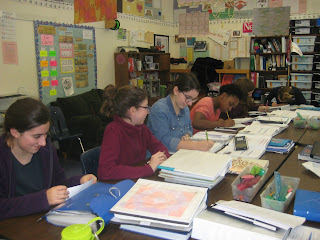Teens and emotions - almost everyone says that middle school years are the hardest. Emotions during the early teens can be strong and confusing. And they can change on a dime. And the crazy thing is...that's normal!
Here is a great article from MindShift about teens and emotions - and how to help them cope. For teachers and parents both, talking with kids about the emotions and normalizing them is key.
For kids, knowing that they are not alone or strange really helps them deal with their changing and strong feelings. Some key things to remember, says Susan David, Harvard educator and author of Emotional Agility, are:
Emotions pass
Emotions are teachers
Courage is "fear walking"
Articulating values helps set an inner compass
Just having a caring adult to listen can help calm the strong emotions our teens are feeling. We can all do that!
Showing posts with label the teen brain. Show all posts
Showing posts with label the teen brain. Show all posts
Tuesday, February 28, 2017
Monday, December 21, 2015
What's inside a middle school brain?
 |
| 6th graders are designing a recreational center for the school using Google Sketch Up. |
It is amazing how much the brain changes from baby to kindergartner - parents are constantly awed by it. In this article by Katarina Schwartz, Harnessing the Incredible Learning Potential of the Adolescent Brain, she says that the teen years are akin to the years from birth to 5 for the ability of the brain to grow and develop.
I believe it! In my experience, middle school kids are some of the most passionate learners there are. They need novelty and stimulation, for sure, and when their learning environment also gives them some autonomy, the magic combination spurs them on to amazing feats.
Witness the intensity of learning that happens in 6-7 STEAM Week - the joy kids show when designing and building bridges or launching rockets. Or the concentration and grit it takes for 8th graders to complete a 20 page thesis and prepare and give oral presentations. From thesis topics like Sugar, America's Favorite Drug, or State of Dreams, Panama's Role in the Power of the United States, you can just hear the passion.
Temple University neuroscientist Laurence Steinberg says that without novelty and intellectual challenge in school, teens are bored and they underachieve.
This past Friday, three eighth grade girls asked me if they could organize the whole school in a drive to collect clothing for a local homeless shelter. Because they know they are supported in taking initiative, they have the courage to challenge themselves and to do good for others.
The developing brain of an adolescent is a wondrous thing! Giving it a place and a chance to grow is a no-brainer.
Thursday, September 10, 2015
Technology in our children's lives
Have iPads replaced conversation at the dinner table? What do infants observe when their parents are on their smartphones? Should you be your child's friend on Facebook?
 In her terrific book, The Big Disconnect, Catherine Steiner-Adair writes about our dilemma as parents and educators: How do we find the right balance with our own and our children's technology use? She walks us through these tricky waters with evidence based on interviews with hundreds of children and families and the latest neuroscience research.
In her terrific book, The Big Disconnect, Catherine Steiner-Adair writes about our dilemma as parents and educators: How do we find the right balance with our own and our children's technology use? She walks us through these tricky waters with evidence based on interviews with hundreds of children and families and the latest neuroscience research. I hope you will read this book. I couldn't put it down. It speaks directly to our worries about how a toddler's brain is affected by screen time. About how we need to heighten our attention to our tweens and teens and what their hidden internet lives are. She helps us grapple with whether to give our second graders iPads. And how to set limits for ourselves and our kids.
Steiner-Adair is practical and sensible and the book is a great read.
We will have two discussion sessions at Parker using this book as a jumping off point. You don't have to read the book to participate, but it would be great if you read even one of the chapters. I'll be there and I'll recruit a teacher or two to weigh in. Let's talk about these issues together!
Tweens,Teens and Technology
Wednesday, October 7
5:00 - 5:45 PM in the Library
Connected Lives - Ages 3 to 10
Thursday, October 15
8:30 - 9:15 AM in the Library
Let me know if you are interested in a later evening time for another session! mtaylor@parkerschool.org
Friday, January 30, 2015
Teen hearts and minds
Insights into the adolescent brain are always welcome. It is both wonderful and challenging to be an adolescent and to teach and parent one, too.
This interview with Frances Jenson Why Teens Are Impulsive, Addiction-prone, and Should Protect Their Brains, gives great insight about what is actually going on inside the developing mind of an adolescent. Her book, The Teenage Brain looks like a great read.
What most interested me in the interview was the advice about using media. Teens (and preteens) don't yet have the ability to stop doing an alluring activity when they need to. For example, they want to keep their phones under their pillow at night - texting and responding to "pings" and not sleeping.
Fortunately our teens have us - their parents and teachers - to help them when their brains are not quite ready to. It's up to us to take the phone away, to set the limits, to help them remember that they can cope with setbacks, and to give them opportunities to practice good decision making.
A few things I have noticed about middle school children is that they are passionate about ideas, embrace causes with all their hearts, and thrive when given real responsibilities. They deeply desire to be part of a close community and to be known - and accepted - for themselves, and forgiven for the mistakes they inevitably make.
The photo above shows preschoolers helping our middle schoolers take out the recycling. Being in the role of a nurturer is something that most teens absolutely love. Within the embrace of a caring community, teens can take intellectual and emotional risks. When they feel confident that adults around them will provide the stops that their own brains can't, they are free to test limits within the bounds of safety.
This interview with Frances Jenson Why Teens Are Impulsive, Addiction-prone, and Should Protect Their Brains, gives great insight about what is actually going on inside the developing mind of an adolescent. Her book, The Teenage Brain looks like a great read.
What most interested me in the interview was the advice about using media. Teens (and preteens) don't yet have the ability to stop doing an alluring activity when they need to. For example, they want to keep their phones under their pillow at night - texting and responding to "pings" and not sleeping.
Fortunately our teens have us - their parents and teachers - to help them when their brains are not quite ready to. It's up to us to take the phone away, to set the limits, to help them remember that they can cope with setbacks, and to give them opportunities to practice good decision making.
A few things I have noticed about middle school children is that they are passionate about ideas, embrace causes with all their hearts, and thrive when given real responsibilities. They deeply desire to be part of a close community and to be known - and accepted - for themselves, and forgiven for the mistakes they inevitably make.
The photo above shows preschoolers helping our middle schoolers take out the recycling. Being in the role of a nurturer is something that most teens absolutely love. Within the embrace of a caring community, teens can take intellectual and emotional risks. When they feel confident that adults around them will provide the stops that their own brains can't, they are free to test limits within the bounds of safety.
Subscribe to:
Posts (Atom)




